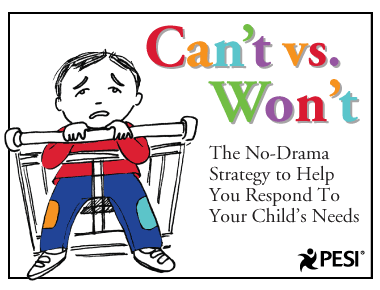Can’t vs. Wont: The No-Drama Strategy to Help You Respond to Your Child’s Needs
Free Worksheet: Distinguishing Can’t From Won’t
PESIinc

After a busy night, you get your child to bed. Finally, some time to catch up on the laundry, dishes and any other tasks that were impossible to get done earlier in the evening. Then you hear:
“Mom…….Come in here….. Please!”
It’s well past his bedtime, and he has to be exhausted. When you check-in on him, he says, “Mom, I need water.”
It's easy to grab him a glass of water to pacify him and get him to sleep, but a few minutes later he’s calling again. And again. The excuses keep coming, and your frustration is rising. Is it that he can’t sleep or won’t sleep?
Making this distinction between can’t and won’t will help you respond to your child’s needs, and support him in moments when he is having difficulty managing his emotions and behaviors. Instead of reacting to disobedience, you can respond to your child in a way that builds connection and reduces the unwanted behavior.
In their new book, The No-Drama Discipline Workbook, Dr. Daniel J. Siegel and Dr. Tina Payne Bryson give you resources to distinguish can't from won't. You can download the worksheet to use at home, or provide it as a resource to the parents you work with.
Daniel J. Siegel, M.D., psychotherapy practice spans 30 years, and he has authored three New York Times bestsellers: Brainstorm, and two books with Tina Payne Bryson, Ph.D., The Whole-Brain Child and No-Drama Discipline. His other books include Mindsight, Pocket Guide to Interpersonal Neurobiology, The Developing Mind, Second Edition, The Mindful Therapist, The Mindful Brain, and Parenting from the Inside-Out (with Mary Hartzell, M.Ed.), and The Whole-Brain Child Workbook (with Tina Payne Bryson), and he is the founding editor of the Norton Series on Interpersonal Neurobiology. Dr. Siegel has been invited to lecture for the King of Thailand, Pope John Paul II, His Holiness the Dalai Lama, Google University, and TEDx.
Dr. Tina Payne Bryson, is a pediatric and adolescent psychotherapist and the Executive Director of the Center for Connection in Pasadena, CA. She is also the co-author (with Dan Siegel) of two New York Times bestsellers: The Whole-Brain Child and No Drama-Discipline, along with The Whole-Brain Child Workbook. You can learn more about her at www.TinaBryson.com, where you can subscribe to her blog and read her articles about kids and parenting.
“Mom…….Come in here….. Please!”
It’s well past his bedtime, and he has to be exhausted. When you check-in on him, he says, “Mom, I need water.”
It's easy to grab him a glass of water to pacify him and get him to sleep, but a few minutes later he’s calling again. And again. The excuses keep coming, and your frustration is rising. Is it that he can’t sleep or won’t sleep?
Making this distinction between can’t and won’t will help you respond to your child’s needs, and support him in moments when he is having difficulty managing his emotions and behaviors. Instead of reacting to disobedience, you can respond to your child in a way that builds connection and reduces the unwanted behavior.
In their new book, The No-Drama Discipline Workbook, Dr. Daniel J. Siegel and Dr. Tina Payne Bryson give you resources to distinguish can't from won't. You can download the worksheet to use at home, or provide it as a resource to the parents you work with.
Download the Worksheet: Distinguishing Can’t From Won’t
Daniel J. Siegel, M.D., psychotherapy practice spans 30 years, and he has authored three New York Times bestsellers: Brainstorm, and two books with Tina Payne Bryson, Ph.D., The Whole-Brain Child and No-Drama Discipline. His other books include Mindsight, Pocket Guide to Interpersonal Neurobiology, The Developing Mind, Second Edition, The Mindful Therapist, The Mindful Brain, and Parenting from the Inside-Out (with Mary Hartzell, M.Ed.), and The Whole-Brain Child Workbook (with Tina Payne Bryson), and he is the founding editor of the Norton Series on Interpersonal Neurobiology. Dr. Siegel has been invited to lecture for the King of Thailand, Pope John Paul II, His Holiness the Dalai Lama, Google University, and TEDx.
Dr. Tina Payne Bryson, is a pediatric and adolescent psychotherapist and the Executive Director of the Center for Connection in Pasadena, CA. She is also the co-author (with Dan Siegel) of two New York Times bestsellers: The Whole-Brain Child and No Drama-Discipline, along with The Whole-Brain Child Workbook. You can learn more about her at www.TinaBryson.com, where you can subscribe to her blog and read her articles about kids and parenting.




